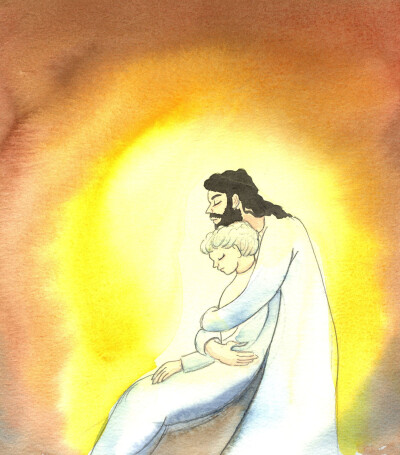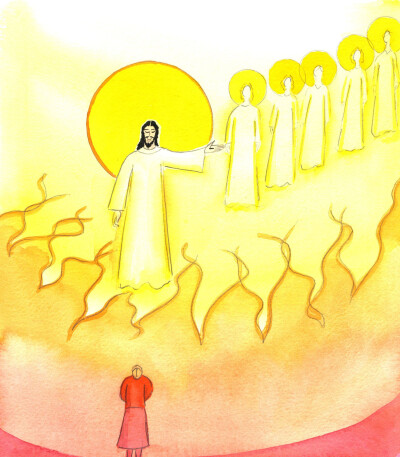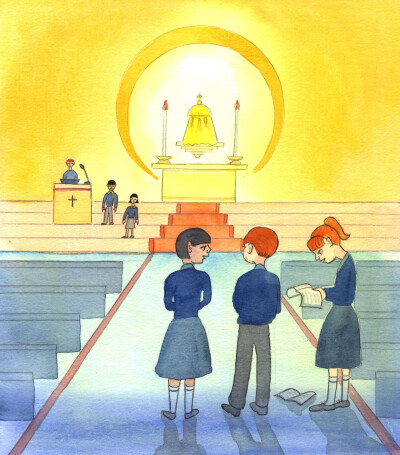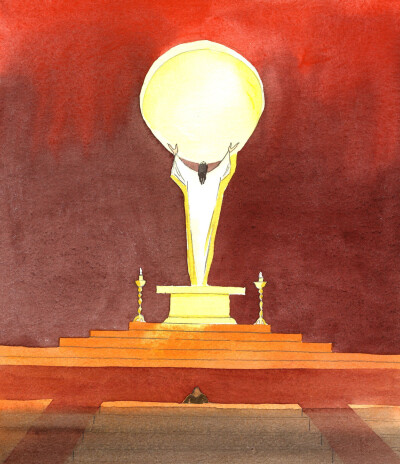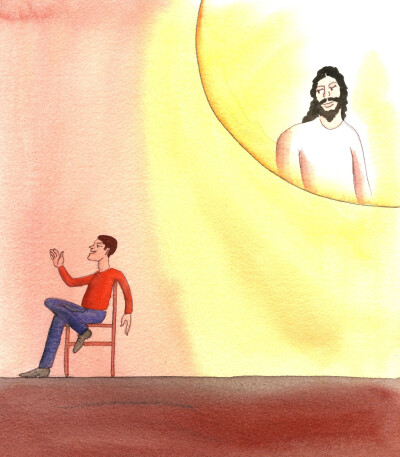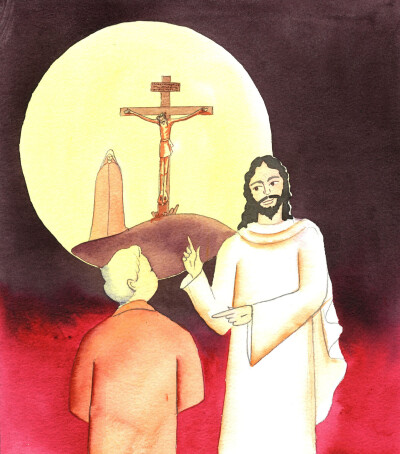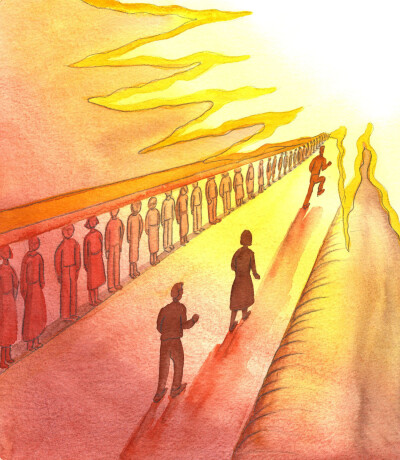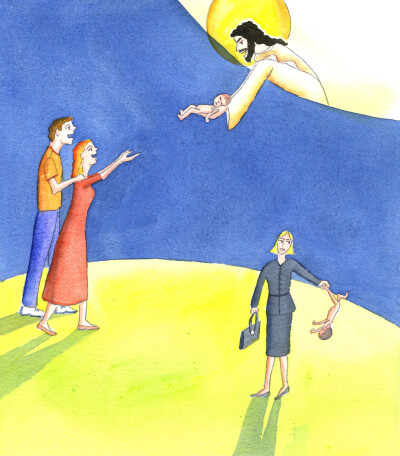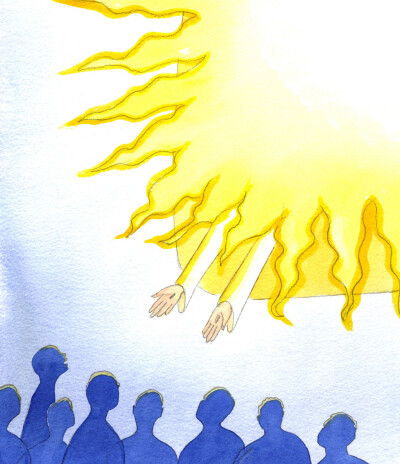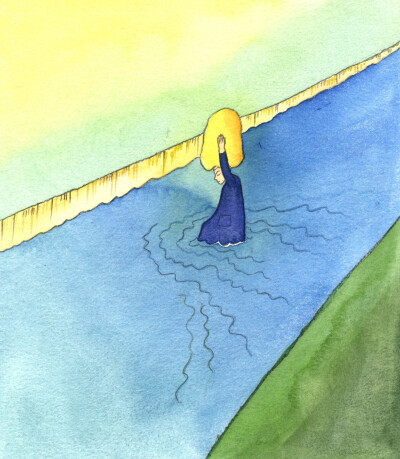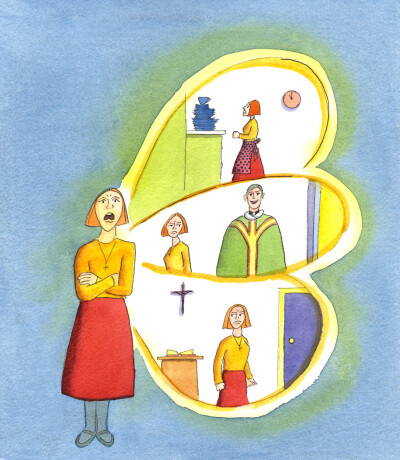Search Page
Showing 41 - 60 of 79
When we can no longer sit up to pray, in sickness or exhaustion, we can be sure that Christ is supporting us in His embrace, as we offer a few words of praise and thanks to our Heavenly Father.
When we turn to Christ in prayer, in gratitude for His gifts and graces, all the Saints are close to us, glad to hear our thanks and praise for the One Who has brought them to Heaven. They long for us to find everlasting joy with Him, and help us by their prayers.
Especially if we are doing important work for Christ, the evil one is capable of hurling painful memories to our imagination, trying to stir up our minds in fruitless speculation, so that we will lose trust in Christ and become miserable or afraid - or full of self-pity, or anxiety. We must not give in, but should focus our minds, by God's grace, on all the good things for which we can be thankful to God.
Those Who encourage children to take a busy part doing 'jobs' during the Sacred Liturgy might make the children feel important but often lead them to become distracted from what is said, and certainly not prayerful. There should be encouragement, rather, for children to know what happens in the Holy Sacrifice, to believe it, to be grateful for God's love and action, and to adore and praise Him.
Have we climbed the mountain of holiness, by God's grace, ready to arrive peacefully at the door to Heaven? God asks us to ask ourselves: Do I love God with my whole heart? Do I favour His Will, above all things? If we do not love God and want to thank and praise Him, we are not ready for Heaven; but what if He should suddenly call us, to leave this earthly life? Wise people get ready, now.
We must not be made despondent by our minor distractions in prayer, or our tiny failings. As sure as miners find what they want in a mine, we can mine spiritual treasure from our little faults, by using each as a reason for prayer. If we are distracted, we can make an act of humility. If we have neglected some good, we can make an act of gratitude for all God's gifts. If we find it hard to forgive, we can praise God for having forgiven us our sins.
No matter how devout a person has been, no matter how grateful to God for His love, that person, when at last approaching Heaven after death, will find himself amazed by the beauty and majesty of the Godhead, and be prompted to exclaim - "I never knew how glorious You are... I never realised how beautiful and how good!"
Every Mass is a triumph of grace, no matter how weak we are. When we unite our thanks and praises, our sorrow-for-sin, and our petitions and intercessions, with Christ's great sacrificial prayer in the Holy Sacrifice of the Mass, we can be confident that our prayer is successful, for it is Christ Himself, from our altar, Who lifts up our prayer, with His, and presents them to our all-holy Father, in the power of the Holy Spirit.
Christ asks us to accept the tragic truth about atheism: that a person who does not believe in God does not pray, never thanks God for anything, never asks for forgiveness from God, never prays for other people, never asks to be delivered from evil in this life, and never prays to be saved and brought to Heaven. Every atheist is in desperate need of the prayers of the faithful, no matter how good a life he seems to lead.
Christ wants each of us to believe that His love for us is real and everlasting. He was willing to live on earth, and even to be mocked and put to death on the Cross, in order to save each of us from the consequences of sin. Every individual can say: "He went to the Cross, for my sake". We can believe, and respond with gratitude - or, with hard hearts, turn away.
People who have really loved God have offered thanks and praise, even amidst difficulties. These, if they persevere, race towards Him when they die, impelled by love to enter His embrace. But those who have kept His laws, but have grumbled a lot, because of their worldly desires or preoccupations, must, after death, do penance for their luke-warmness before they can enter Heaven.
Living as if trapped in an underground cave, a person who is full of self-pity has a spiritual ailment. That person deserves sympathy, and perhaps rest, and practical help; but self-pity is damaging in that the one so afflicted is usually not very thankful for what is genuinely good in life: including the gift of life; and it cuts off the preoccupied one from sharing the interests, joys and sorrows of other people.
People give joy to Christ by their gratitude for the gift of life. If the whole world were to show such delight at the birth of children, how much happier a place it would be! And how terrible for Christ, to see His gift of life despised and discarded.
Helped by our prayers, offered in the name of Christ, the Holy Souls make their way towards Heaven. All those who are about to be welcomed into Heaven are by now carefree, purified, and no longer remorseful or saddened by their sins. They see Heaven as an undeserved free gift, so their hearts and minds are full of thanks and praise - just like the Saints whose company they are about to enjoy.
Even in infancy, Jesus Christ set an example of trust, as He entrusted Himself to the care of human beings, when He had 'left behind His glory' as the Son of God. He came amongst us on earth, even though He knew He would be mocked and rejected by many. We give Him joy when we turn to Him with gratitude and gladness.
By sincere prayer in Christ's name, we can make a 'bridge' - thanks to Divine grace - between what we desire now, and what we ought to desire in order to become holy. A new stage of determination and repentance can give us a real hope of making progress on our spiritual journey instead of continuing in mediocrity or worldliness.
Christ knows that a person whose love for Him is sincere, who recognises the wonderful graces given to him, and realises his privileged state as a sharer in Divine life, is truly grateful; and such gratitude expresses itself in praise and thanks, offered to God with outward as well as inward expressions of reverence. A person who acts in this way opens his heart to receive an even greater number of graces.
Only by the grace of God can we persevere in grace. We should give thanks to God, and take no pride in our success, whenever we manage to endure a distressing or painful episode, or a time of persecution, without becoming resentful, envious, or full of self-pity or gloom. It is as though we have forded a dangerous river, with our soul held high above our head.
We are wasting time if we spend time grumbling instead of offering thanks. If we grumble, we feed our discontent, perhaps about our everyday duties, about the decisions of the priest, or about the dryness of our prayer. How can we pray without ceasing, with thankful hearts, if we cannot accept the Will of God in our lives (though this does not mean that we should be silent in the face of evil)?
It is important to remain joyful, and hopeful, trusting in Christ. We might sometimes find our minds dwelling on sad or horrible events of our life, of many years earlier, and we experience heartache, just as we do when we dwell on the sufferings of other people - especially starving children - in the present day. But sad memories should propel us not towards despondency but action, whether thanks to God for His many gifts to us, or help for the needy.
Showing 41 - 60 of 79

